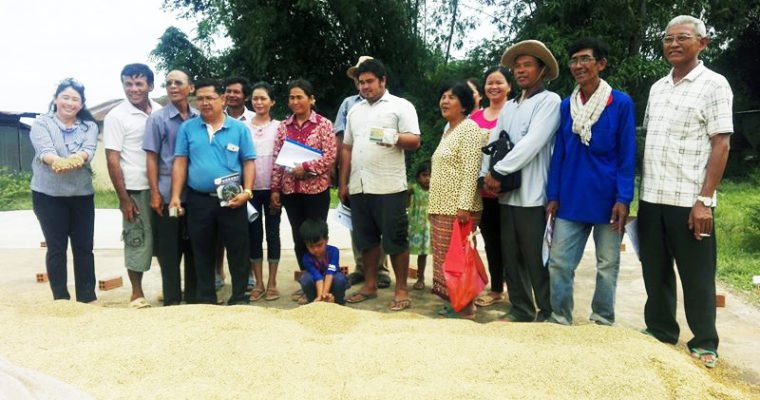Battambang, Cambodia – The Sangha Phal Agricultural Cooperative was established and registered officially at Battambang Agricultural Department in February 2004. The agricultural cooperative, located in Prey Sangha Village, Khnach Romeas Commune, Bavel District, Battambang, was established initially with 48 members of whom 15 were female with a total capital of KHR 1,920,000 (Cambodian riels) or USD 464 (1 share is KHR 30,000 or USD 7) and a membership fee of USD 10,000 (USD 2).
“The objective of establishing Sangha Phal Agricultural Cooperative is to (1) join forces to compete for market shares for agricultural produce; (2) increase the income through investment of shares and joint investment, and; (3) create other employment in support of agriculture,” says Hul Kleom, Chairperson of the cooperative board.
Sangha Phal Agricultural Cooperative receives support from many partners, including the AFOSP-MTCP2 Programme in Cambodia, the Battambang Agricultural Department which offers training on paddy farming techniques, ADES Organization, Harvest, Ecozone, and JICA which strengthens paddy seedlings production capacity, boosting projects, REAPIP, Buddhism for Development Organization which strengthens capacity on cooperative management and market strategies. Currently, the cooperative has a membership of 218 (90 are women) and with a total capital of KHR 260,350,000 (USD 62,965).
Like many places in the northwest of Cambodia, Sangha Phal Agricultural Cooperative has been producing Phka Rumduol, Sen Kraoub, and Sragae paddy seedlings but mainly for their own consumption. After learning that growing paddy seedlings can be profitable, some farmers in the village have shifted from growing paddy for food to paddy seedlings for supplying to the cooperative as the cooperative has markets in Chamroeun Phal Company and some other depots in Battambang as well as to other cooperative-based farmers in other areas. On average the cooperative can produce 267 tons of paddy seedlings per year and each member could see progress in themselves through the production of paddy seedlings for sale to the cooperative.
“Before joining the cooperative, I did not produce paddy seedlings for sale. I only did paddy farming once a year. At times, I experienced loss due to the lack of an irrigation system. We only depended on rain. After joining the cooperative, my livelihood improved as I can now produce rice seedlings to sell. I have three hectares of paddy but I can produce paddy seedlings only on 16 acres (0.16 hectare). The remaining is kept for growing paddy used for the consumption of my family. Last year, I produced 600 kilograms of dry paddy and sold it at KHR 3,000 (USD 72) per kilogram,” shares Iet Vannak, member of cooperative account and paddy seedling production.
However, not all members of the cooperative can produce paddy seedlings because doing so requires proper techniques. Members are required to undergo training and follow the instructions of the cooperative. The cooperative chooses good quality paddy seedlings for supplying to the members. These are distributed to the members for planting. After harvesting, the members sell the seedlings to the cooperative which offers better prices compared to middlemen.
“I feel really happy because the community helps in finding a market for us paddy seedling producers for selling at a high price. Those who have a vast amount of land can earn a considerable income. As for me, I only have a small plot of land as I have given some of my land to my children,” adds Vanak.
Paddy seedling producers do face some challenges, like when they cannot sell their seedlings as supplies are higher than the demand, resulting in rice seedlings just being set aside in the storehouse. During such situations, the cooperative committee extends help by providing the members with payments through a bank loan to meet their budgetary requirements, as well as looking for agricultural cooperatives in other areas to purchase the seedlings.
Over the past 10 years, Sangha Phal Agricultural Cooperative has expanded its resources by purchasing land amounting to USD 30,000 for construction of a paddy storehouse and community sales stalls and purchasing paddy planting machines worth USD 2,500. The government shouldered the construction of the paddy storehouse. #
About MTCP2
The Medium-Term Cooperation Program Phase 2 (MTCP2), a five-year capacity building program supported by the International Fund for Agricultural Development (IFAD), the Swiss Agency for Development and Cooperation (SDC), and the European Union (EU) , has been implemented in 22 countries across three sub-regions—Southeast Asia (through the ASEAN Farmer Organization Support Program-AFOSP-MTCP2), South Asia, and the Pacific—engaging 86 national federations of farmers organizations with 1,628 sub-national farmers organizations (FOs) with a total membership of around 43.5 million small-scale women, men and young farmers. The funding support (12 million USD) served as a catalytic fund that allowed FOs to enhance their capacity to engage in policy dialogues and to be effective channels of economic services to farmers. The program has contributed to the formation of strong national platform of FOs with improved capacity to engage in constructive policy processes and mobilize resources from mainstream agricultural development programs like extension services, credit, and pre and post-harvest facilities. The program also helped in re-structuring farmers’ associations into community-based social enterprises or as commodity-based cooperatives as well as consolidating FOs into agricultural cooperative federations/union to strengthen the role of small-scale farmers within an inclusive and sustainable value-chain. The program is being implemented by the consortium Asian Farmers’ Association for Sustainable Rural Development (AFA) and La Via Campesina (LVC).




Comments are closed